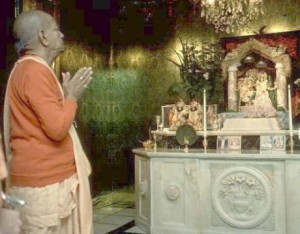
Srila Prabhupada meets Kaliya, New Vrindaban’s original cow, on the path to the New Vrindaban farmhouse, 1976.
Madhava Gosh Recalls Srila Prabhupada Reuniting with Kaliya, New Vrindaban’s First Cow.
Originally published in Volume 3 #9 of the Brijabasi Spirit 1976.
We waited at the gate on the Vrindaban road the morning Srila Prabhupada took darshan at the temple of Radha Vrndavana Natha. He arrived surrounded by two busloads of prabhus from Radha Damodara who had walked up behind him, only taking time off from flooding the country with Prabhupada’s books to see His Divine Grace. As Prabhupada got out of the truck that brought him part of the way up the road, the devotees made a path through the assembled cows for him to walk, and we fell in behind.
The green foliage canopying the road glistened with dew in the early morning sun. Prabhupada more flowed than walked over the foot-trodden dirt road, deftly avoiding the water-filled holes, and we ducked branches to keep up. In the woods alongside, the cows swished the brush aside, flashing colorfully amongst the verdant growth.
As we turned onto the last stretch, the over-growth opened up into a grazing area, and Mother Kaliya could be seen walking alongside. She was the first cow at New Vrindaban, and Prabhupada drank her milk when he spent a whole month at Vrindaban a long time ago. In the karmi world cows know they are going to be slaughtered at the end of their economic usefulness and they will not let humans come near them without attempting to flee. Yet Kaliya seemed totally calm despite the large crowd, keeping pace with aged gait (No one knows how old she is, probably fifteen or so).
Advaitacarya dasa asked Prabhupada if he had named her and he nodded yes. Just as if she had heard, Kaliya turned from the path on which she was walking and lightly skipped down the short steep bank to the road, causing the devotees there to stop and let her pass right next to Prabhupada, as close as she could without causing him to break stride. Then she briskly headed down the road. She stopped once and looked back over her shoulder, then continued on towards the abode of Radha Vrindaban Natha.












